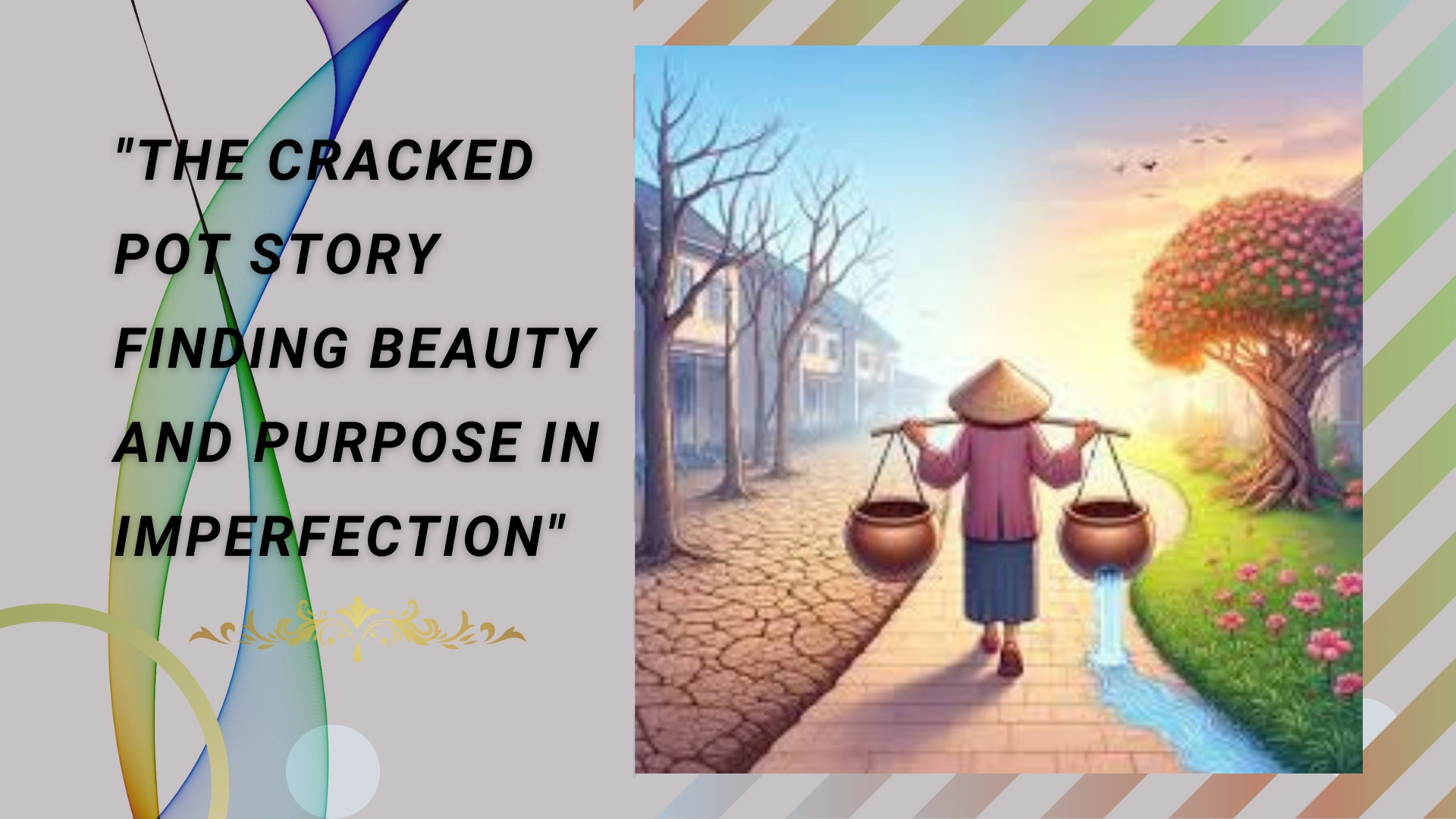Welcome to (International Stories). In this story, we will discuss “The Cracked Pot Story Finding Beauty and Purpose in Imperfection” I hope you will like this story and understand it.
“The Cracked Pot Story Finding Beauty and Purpose in Imperfection”
Once upon a time, there was an old woman who had two large pots, hanging around her neck. One pot had a crack, while the other was perfectly fine and always brought full water.
For two years, it was a daily routine, that the woman would bring only one and a half pot of water into the house.
Sure, the right vessel was proud of its achievements, but the cracked vessel was ashamed of itself for being able to do only half the job.
After this bitter failure of two years, one day the vessel with the crack said to the woman, “I am ashamed of myself, because the crack in my side causes water to flow down the way.”
The woman laughed and replied, “Have you ever noticed that flowers bloom on your side of the sidewalk, but not on the other side of the pot?”She said, “I always knew your flaws, so I planted flower seeds alongside the way, and each day that we walked, you water them.”
In two years, I plucked these beautiful flowers and decorated my table. If you weren’t, this beauty wouldn’t have blessed the home.
Lesson:
The moral of the story is that each of us has our own unique flaw. But the cracks and imperfections we have, that make our lives together interesting and rewarding. You just have to accept each person for who they are. Have to and find the goodness within.
Purpose in imperfection
“Purpose in imperfection” suggests that flaws and shortcomings can hold meaning and significance. Here are a few ways to think about it:
Growth and Learning: Imperfections often lead to valuable lessons. Mistakes can be powerful teachers, pushing us to grow and adapt.
Authenticity: Embracing imperfections allows for authenticity. It encourages us to be real and relatable, fostering deeper connections with others.
Beauty in Diversity: Imperfections contribute to the uniqueness of individuals and experiences. They create a rich tapestry of perspectives and narratives.
Resilience: Navigating imperfections can build resilience. Overcoming challenges strengthens character and prepares us for future hurdles.
Creativity: Many artistic expressions celebrate imperfection. The quirks and irregularities can spark creativity and innovation, leading to unexpected beauty.
Recognizing purpose in imperfection can help shift our focus from a quest for flawlessness to an appreciation for the journey of being human.
Importance of imperfection
The importance of imperfection lies in its inherent role in fostering growth, creativity, and authenticity. Imperfection allows for learning and improvement. In a world often focused on perfection, embracing imperfection encourages personal development, resilience, and the acceptance of human flaws. Here’s an in-depth study of its importance:
1. Authenticity and Human Connection
Imperfection is a natural part of being human. When people embrace their flaws, they present themselves authentically, creating genuine connections with others. Striving for constant perfection can lead to stress and unrealistic expectations, but imperfection fosters empathy and relatability.
2. Creativity and Innovation
Creativity thrives in imperfection. Some of the most groundbreaking ideas come from trial and error, embracing mistakes, and learning from them. Perfection often stifles creativity because it limits experimentation and the ability to take risks.
3. Growth and Learning
Imperfection is a catalyst for growth. Mistakes and failures provide valuable lessons, pushing individuals to reflect, adapt, and improve. Without imperfection, there would be no opportunity to grow, evolve, or develop resilience.
4. Unique Beauty
Imperfection can also be beautiful. This idea is celebrated in Japanese aesthetics through concepts like wabi-sabi, which embraces the beauty found in things that are imperfect, incomplete, or transient. It reminds us to appreciate the uniqueness in flaws and natural cycles.
5. Mental Well-being
Perfectionism can lead to burnout, anxiety, and dissatisfaction. Recognizing and accepting imperfection can reduce stress and promote mental well-being, allowing people to pursue their goals in a healthy and sustainable way. It fosters self-compassion and a kinder approach to personal challenges.
In essence, imperfection is not just something to tolerate but something to appreciate, as it enriches our lives in various ways.
CONCLUSION:
The conclusion of this story offers a powerful lesson about the value of accepting imperfections. Every person, like the cracked pot, has flaws that may seem like weaknesses or shortcomings. However, these flaws can contribute to beauty and positivity in ways that are not immediately obvious. The cracked pot, despite its inability to carry a full pot of water, nurtured flowers along the path, creating beauty that enriched the old woman’s life.
The key message is that we must learn to embrace both our own imperfections and those of others. Instead of being ashamed of our flaws, we should recognize the unique value they bring to our relationships, communities, and environments. Each person’s individuality—complete with their imperfections—can contribute to a more diverse, interesting, and rewarding life.
This story reminds us to shift our perspective from focusing on what’s “wrong” or lacking to appreciating the unexpected good that comes from our uniqueness. It encourages us to see the beauty in our differences and to realize that our lives together are enriched when we accept and celebrate these differences.
Ultimately, the moral of the story is about compassion, self-acceptance, and recognizing that beauty and worth often lie in the things we perceive as imperfect. By appreciating these “cracks,” we can live a more fulfilling and harmonious life.
FAQ:
What is the main message of the story?
The story teaches us to embrace our flaws, as they can bring unexpected beauty and value to life. Just like the cracked pot watered flowers, our imperfections often contribute positively in ways we may not notice.
Why did the cracked pot feel ashamed?
The cracked pot felt ashamed because it believed it was failing in its duty by losing water along the way, thus only bringing half the amount of water home each day. It saw itself as incomplete compared to the perfect pot.
What did the old woman explain about the cracked pot’s flaw?
The old woman revealed that the crack in the pot was actually beneficial. She had planted flower seeds along the path knowing the water would nourish them, allowing flowers to bloom, which she could then use to beautify her home. The flaw had a purpose.
What does the story suggest about self-acceptance and relationships?
The story suggests that we should accept our own and others’ flaws, recognizing that imperfections can make life richer and more rewarding. Relationships grow stronger when we acknowledge and appreciate the unique contributions each person brings, flaws and all.
How does the old woman’s approach symbolize wisdom?
The old woman’s approach reflects wisdom by turning a perceived weakness into an asset. She knew about the pot’s crack but saw its potential for growth, just as in life we can choose to see the good in imperfections and turn them into strengths.
What life lesson can we take away from the cracked pot’s journey?
The life lesson is that our flaws and challenges don’t diminish our worth. Instead, they provide opportunities for growth, beauty, and contributions in ways we may not initially realize. What seems like a limitation can actually enrich the world around us.
Why is it important to shift perspective when viewing flaws?
Shifting perspective is important because it allows us to see how flaws, instead of being failures, can lead to unexpected positives. By changing our view, we learn that imperfections can be sources of growth, creativity, and fulfillment.
How does this story encourage personal growth?
The story encourages personal growth by teaching us that self-acceptance and seeing the value in our imperfections can lead to inner peace and the discovery of new strengths. It inspires us to use our unique flaws for good.
Abu ali sina was intelligent hakeem his a historical story
A king built a very magnificent palace an Amazing story
You remove yourself from the ring of desires. An amazing story



good
Amazing content.